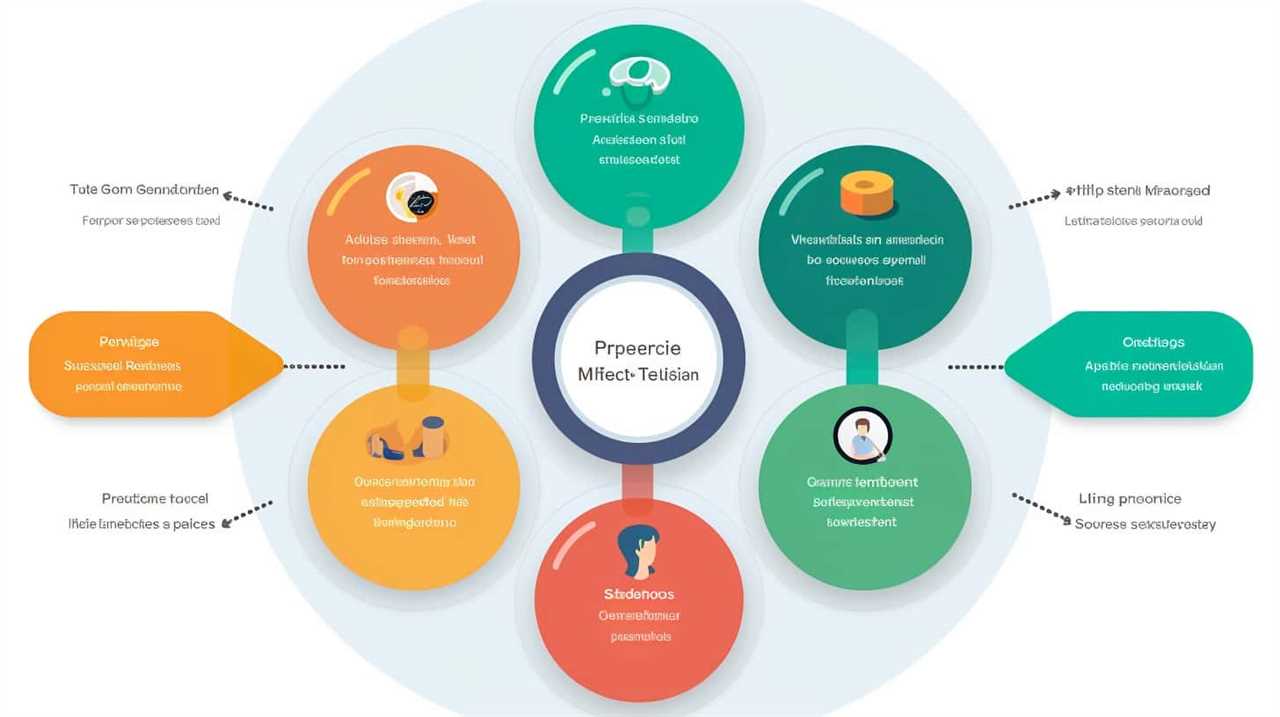Imagine trying to navigate through a vast sea of websites with no guidance. Overwhelming, right? This is exactly what SEO titles do. They act as beacons, directing users to the content they are looking for.
In this article, we’ll dive into the art of formatting SEO titles. We’ll explore the structure, keywords, and modifiers that make these titles shine.
Get ready to master the art of crafting captivating SEO titles that will hook your audience and boost your online presence.
Key Takeaways
- SEO titles significantly impact search engine rankings and click-through rates.
- Well-optimized SEO titles improve click-through rates by providing a clear preview of the page’s content.
- Keyword placement plays a significant role in improving visibility and ranking.
- Balancing SEO optimization with readability is crucial for creating engaging and understandable titles.
Why SEO Titles Matter
SEO titles matter because they significantly impact search engine rankings and click-through rates. Optimizing SEO titles for search engines is crucial to increase visibility and drive organic traffic to your website.

When crafting SEO titles, it’s important to include relevant keywords that accurately describe the content of your page. This helps search engines understand the purpose of your page and match it with relevant search queries. Additionally, well-optimized SEO titles can improve the click-through rate, as they provide a clear and compelling preview of what users can expect from your page.
Meta descriptions also play a role in SEO rankings. While they don’t directly impact rankings, they can influence click-through rates by providing a concise summary of the page’s content.
Understanding the Structure of an SEO Title
When it comes to creating an effective SEO title, understanding its structure is crucial. By following a well-organized format, you can optimize your title for search engines and attract more traffic to your website.
One key aspect to consider is the placement of keywords, as this plays a significant role in improving your website’s visibility and ranking.

Effective SEO Title Structure
To understand the structure of an SEO title, we should examine the effective title structure that helps optimize search engine results.
When it comes to creating an SEO title that drives traffic and improves rankings, there are a few key elements to consider:
- Keyword research: Conduct thorough keyword research to identify the most relevant and high-performing keywords to include in your title. This will help search engines understand the content of your page and match it with relevant search queries.
- On-page optimization: Incorporate the chosen keywords strategically in your title, ensuring they appear at the beginning to maximize visibility. Additionally, keep your title concise, compelling, and within the recommended character limit to avoid truncation in search results.
- Compelling and descriptive: Craft a title that not only includes keywords but also entices users to click through to your page. Use clear and descriptive language that accurately represents the content and value of your page.
Importance of Keyword Placement
In our exploration of the structure of an SEO title, we’ll now delve into the significance of keyword placement.
Understanding the importance of keyword placement is crucial for effective on-page optimization and successful keyword research.

When crafting an SEO title, it’s essential to strategically place your targeted keywords to enhance visibility and improve search engine rankings.
By placing keywords towards the beginning of the title, you increase their prominence and make it easier for search engines to understand the content of your page.
Additionally, incorporating relevant keywords throughout the title can help attract the attention of your target audience and entice them to click on your website.
Proper keyword placement is a fundamental aspect of optimizing your SEO title and maximizing your online presence.

Choosing the Right Keywords for Your SEO Title
When choosing the right keywords for our SEO title, we need to consider their relevance and importance.
It’s crucial to strike a balance between optimizing for search engines and ensuring readability for our audience.
Additionally, incorporating long-tail keywords can bring added benefits by targeting more specific search queries.
Keyword Relevance Importance
Our team’s focus is on selecting the most relevant keywords for optimizing our SEO titles. Keyword relevance is of utmost importance as it directly impacts our website’s visibility and search engine ranking. To ensure we choose the right keywords, we follow a meticulous process of keyword research. This involves analyzing search volume, competition, and relevance to our content.

When optimizing meta descriptions, we consider the following factors:
- Relevance: Our meta descriptions must accurately reflect the content of the page and align with the chosen keywords.
- Length: Maintaining a concise meta description that fits within the recommended character limit ensures better readability and click-through rates.
- Persuasiveness: Crafting compelling meta descriptions that entice users to click through to our website is crucial for driving organic traffic.
In the next section, we’ll explore the delicate balance between SEO optimization and readability to further enhance our SEO titles’ effectiveness.
Balancing SEO and Readability
To strike the right balance between SEO optimization and readability, we rely on a careful selection of keywords for our SEO titles. Finding the right balance means optimizing for search engines while also ensuring that our titles are engaging and easy to understand for readers.
We understand that our audience desires mastery in SEO, which is why we prioritize keyword relevance and readability in our title creation process. By incorporating the right keywords, we can improve our chances of ranking higher in search engine results while still providing valuable and compelling content to our readers.

It’s a delicate dance, but with the right approach, we can achieve both SEO success and reader satisfaction.
Long-Tail Keyword Benefits
Choosing the right keywords for our SEO title involves understanding the benefits of long-tail keywords. When conducting long tail keyword research, we can uncover valuable insights that help us optimize our SEO title effectively.
Here are the benefits of using long-tail keywords:
- Higher Conversion Rates: Long-tail keywords are more specific and targeted, attracting users who are actively searching for what we offer. This increases the likelihood of conversion.
- Lower Competition: Long-tail keywords have less competition compared to generic keywords. By optimizing our SEO title with long-tail keywords, we can rank higher in search engine results and attract more organic traffic.
- Better User Experience: Long-tail keywords align closely with user intent, providing relevant and valuable content. This enhances the user experience and increases engagement on our website.
Understanding these benefits allows us to make informed decisions when optimizing long-tail keywords in our SEO title. By incorporating power words, we can further enhance the effectiveness of our SEO title and attract maximum attention.

Incorporating Power Words in Your SEO Title
We have found that incorporating at least three power words in your SEO title can significantly boost its effectiveness. Power words are persuasive and compelling terms that evoke emotions and grab the attention of readers.
By using power words in your SEO title, you can increase engagement and compel users to click on your link. These words have the power to captivate your audience and make your title stand out from the competition. Some examples of power words include ‘ultimate,’ ‘excellent,’ ‘guaranteed,’ and ‘essential.’
By strategically incorporating these words into your SEO title, you can create a sense of urgency and appeal to the desires of your target audience. This won’t only improve your click-through rates but also enhance your overall SEO performance.
Now, let’s explore how you can use title tag modifiers to further enhance your SEO strategy.

Using Title Tag Modifiers to Enhance SEO
To further enhance our SEO strategy, let’s explore how we can incorporate title tag modifiers into our SEO titles.
Title tag modifiers are words or phrases that can be added to the title tag of a webpage to optimize its visibility in search engine results. By using these modifiers, we can improve the relevance and click-through rate of our meta titles.
Here are three ways to use title tag modifiers effectively:
- Including location modifiers: Adding specific locations to our titles can help target local search queries and attract relevant traffic.
- Utilizing action verbs: Incorporating action verbs in our titles can make them more engaging and compelling, encouraging users to click on our links.
- Using descriptive adjectives: Including descriptive adjectives in our titles can help convey the unique selling points of our content and differentiate it from competitors.
Crafting Compelling and Click-Worthy SEO Titles
To continue our exploration of optimizing SEO titles, let’s dive into crafting compelling and click-worthy titles that captivate our audience and drive higher engagement.

Crafting effective titles requires a combination of keyword research and creative writing skills. Conduct thorough keyword research to identify the most relevant and high-performing keywords for your content. Incorporate these keywords strategically in your titles to increase visibility and attract the right audience.
However, it’s not just about stuffing keywords into your titles; they need to be compelling and click-worthy. Use attention-grabbing language, intriguing questions, or enticing promises to pique the curiosity of your audience. Consider the emotional impact of your titles and how they can resonate with your target readers.
Ultimately, the goal is to create titles that not only rank well in search results but also entice users to click on your content.
As we move forward, let’s now explore optimizing SEO titles for mobile users.

Optimizing SEO Titles for Mobile Users
Optimizing SEO titles for mobile users requires considering their limited screen space and the need for concise, attention-grabbing content. Mobile friendly SEO titles are essential to ensure that your website ranks well in mobile search results and attracts mobile users.
When optimizing title length for mobile users, keep the following in mind:
- Keep it short and sweet: Mobile users have shorter attention spans, so aim for titles that are around 40-60 characters long.
- Use keywords strategically: Include relevant keywords at the beginning of your title to make it more visible in search results.
- Create a sense of urgency: Use action verbs and compelling language to encourage mobile users to click on your title.
Best Practices for Formatting SEO Titles
When formatting SEO titles, we adhere to the best practices for ensuring maximum visibility and engagement. One crucial aspect is optimizing keyword density in the title. By including relevant keywords that accurately describe the content, we can improve the chances of our titles appearing in search engine results. Additionally, meta description optimization plays a vital role in attracting users to click on our titles. A well-crafted meta description provides a concise and compelling summary of the page, enticing users to visit our website. To summarize the best practices for formatting SEO titles, we have created a table outlining three key strategies:
| Best Practice | Description |
|---|---|
| Optimize keyword density | Include relevant keywords in the title to improve visibility in search engine results. |
| Craft compelling titles | Create titles that are concise, keyword-rich, and compelling to capture the attention of users. |
| Optimize meta descriptions | Write enticing meta descriptions that accurately summarize the page and encourage users to click. |
Testing and Analyzing the Success of Your SEO Titles
One key step in improving the effectiveness of our SEO titles is testing and analyzing their success. By analyzing metrics and constantly monitoring the performance of our titles, we can make data-driven decisions to optimize our content for better conversion rates.

Here are three important aspects to consider when testing and analyzing the success of our SEO titles:
- Click-through rate (CTR) analysis: By tracking the percentage of users who click on our titles in search engine results pages (SERPs), we can determine which titles are more enticing and engaging.
- Bounce rate analysis: Monitoring the bounce rate can help us identify if our titles accurately reflect the content of our pages. High bounce rates may indicate a mismatch between the title and the actual content, leading to lower conversion rates.
- A/B testing: By conducting A/B tests, we can compare the performance of different title variations and determine which ones generate more clicks and conversions.
Frequently Asked Questions
What Is the Ideal Length for an SEO Title?
The ideal length for an SEO title depends on various factors, but generally, it should be around 50-60 characters. Keywords play a crucial role in SEO titles, as they help improve search engine visibility and attract relevant traffic.
How Often Should I Update My SEO Titles?
To optimize our SEO titles for better search engine rankings and improve the click-through rate, we should update them regularly. Effective strategies include incorporating relevant keywords, using compelling language, and ensuring the titles accurately reflect the content.
Can I Use the Same SEO Title for Multiple Pages on My Website?
Using the same SEO title for multiple pages on your website can negatively impact search rankings. To optimize SEO titles for different pages, follow best practices such as including relevant keywords and making each title unique.

Should I Include My Brand Name in the SEO Title?
Should we include our brand name in the SEO title? Including keywords in the SEO title is important for search engine rankings. The placement of keywords affects how well our website ranks in search results.
Is It Necessary to Include Numbers or Symbols in an SEO Title for Better Performance?
Using numbers in SEO titles can have both pros and cons. It can enhance visibility and attract attention but may also limit creativity. To optimize SEO titles for different search engines, consider their specific requirements and guidelines.
Conclusion
So, there you have it. The secret to formatting a killer SEO title.
It’s all about understanding the structure, choosing the right keywords, and incorporating power words.

But here’s the ironic twist – even with all this effort, success isn’t guaranteed. That’s where testing and analyzing come in.
So, go ahead and craft those compelling titles, but always remember to measure their impact.
After all, in the world of SEO, the only constant is change.










